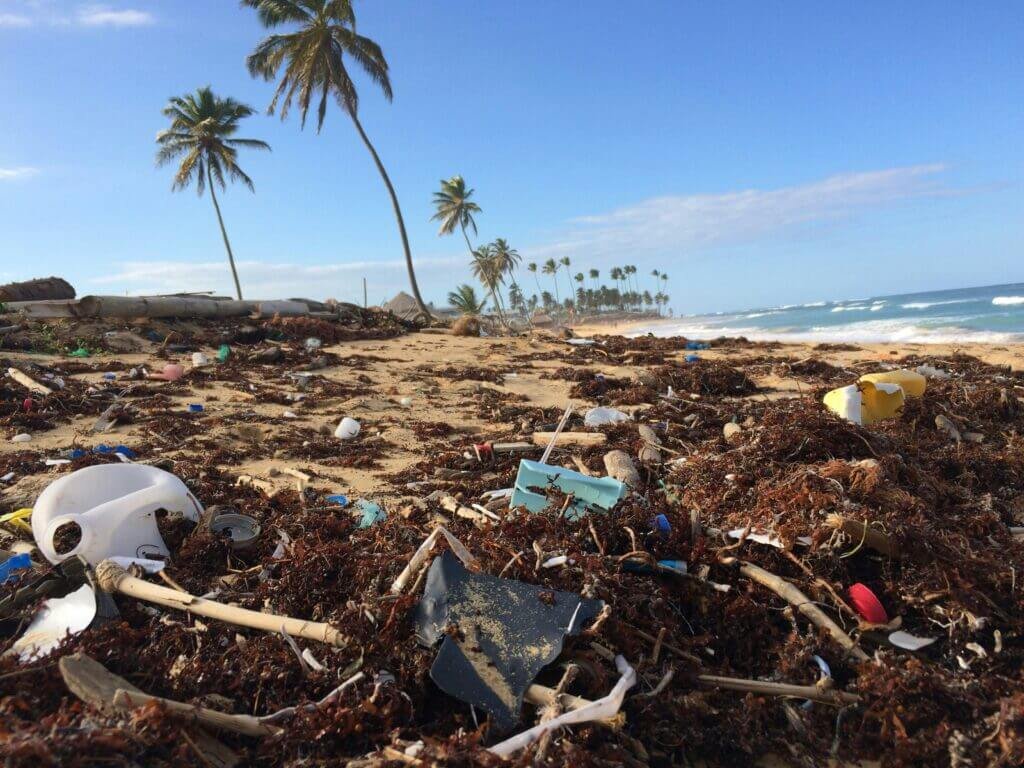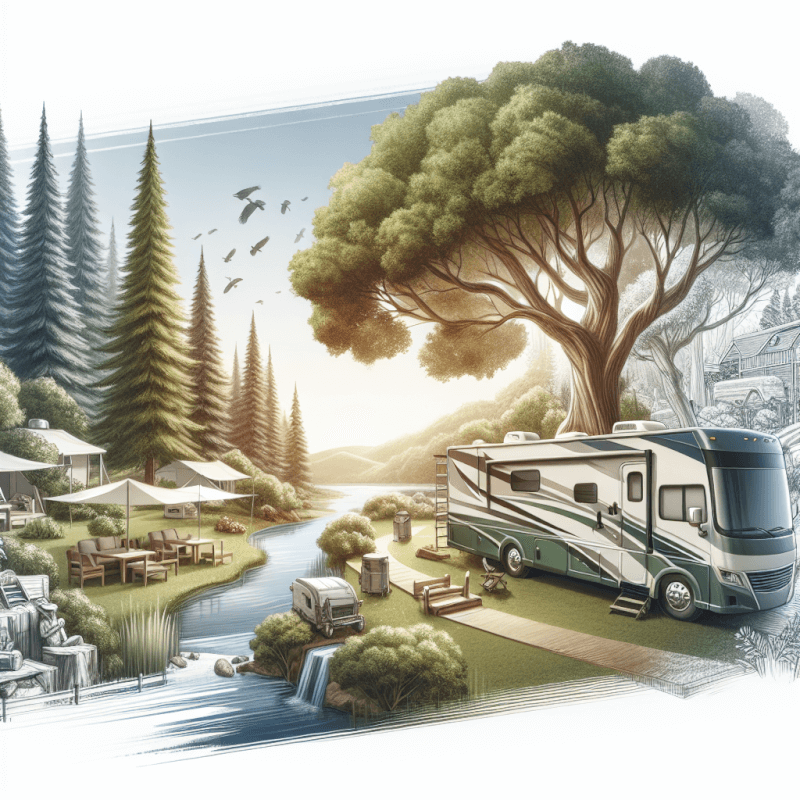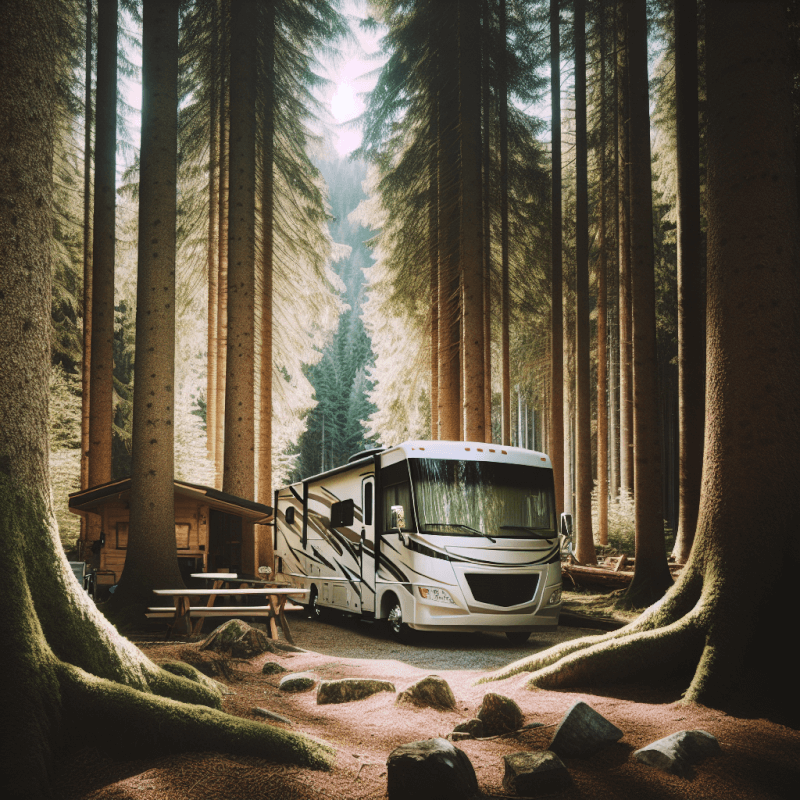Planning a camping trip in an RV can be an exciting and adventurous way to explore the great outdoors. However, it’s important to be aware of the rules and etiquette that come with this unique experience. From respecting quiet hours to properly disposing of waste, understanding and following these guidelines will not only make your trip more enjoyable for you, but also for your fellow campers. In this article, we will highlight the essential rules and etiquette for camping in an RV, ensuring that you have a memorable and respectful experience in the great outdoors.
Choosing the Right Campground
Camping in an RV is a fantastic way to explore the great outdoors and enjoy some quality time with friends and family. However, choosing the right campground for your RV adventure is crucial to ensure a pleasant and enjoyable experience. Before making a reservation, it’s essential to do some research to find a campground that meets your needs and preferences.
Researching Campgrounds
To start your research, consider what kind of camping experience you’re looking for. Are you interested in a secluded, off-the-grid campground, or would you prefer a campground with amenities such as electricity, water hookups, and Wi-Fi? Think about the location as well, whether you want to be near hiking trails, lakes, or other attractions.
Make use of online platforms and resources dedicated to campgrounds, such as campsite review websites or camping apps. These platforms often provide detailed information about campgrounds, including user reviews, amenities, and even photos. These first-hand accounts can give you a good idea of what to expect.
It’s also important to check the campground’s reservation policies and availability. Some campgrounds may require reservations well in advance, especially during peak season. Be sure to check if they allow same-day reservations or have a first-come, first-served policy.
Reserving a Campsite
Once you’ve done your research and identified a campground that suits your preferences, it’s time to make a reservation. Contact the campground directly, either by phone or through their website, and inquire about availability. If possible, provide them with your RV’s specifications, such as size and slide-outs, to ensure they can accommodate you appropriately.
Be prepared to provide a deposit or pay the full amount upfront when making your reservation. Many campgrounds have cancellation policies, so read the fine print before making a payment. It’s also a good idea to confirm the check-in and check-out times to plan your arrival and departure accordingly.
Understanding Campground Rules
Every campground has its own set of rules and regulations to ensure the safety and enjoyment of all campers. It’s crucial to familiarize yourself with these rules and abide by them during your stay. Rules may vary from campground to campground, but here are some common ones to keep in mind:
Campground quiet hours: Most campgrounds have designated quiet hours during which campers should minimize noise to ensure everyone’s rest. Be respectful of these hours and keep noise levels down, especially during the night.
Speed limits: Just like in regular traffic, speed limits also apply within campgrounds. Drive slowly and cautiously, keeping an eye out for pedestrians and other vehicles.
Campfire regulations: Campfires are a quintessential part of camping, but it’s essential to follow the campground’s regulations when it comes to campfire usage. Some campgrounds only allow fires in established fire pits, while others may have restrictions depending on the weather conditions.
By understanding and respecting the campground rules, you’ll create a pleasant environment for yourself and fellow campers.
Preparing Your RV
Before hitting the road and heading to the campground, it’s crucial to ensure that your RV is prepared and ready for your adventure. Taking care of necessary permits, packing essential supplies, and checking your RV systems will help guarantee a smooth camping experience.
Checking for Necessary Permits
Some campgrounds, especially those in national parks or protected areas, may require specific permits for camping and entering the area. Before making your reservation, check if any permits are necessary and make sure you obtain them in advance. Failure to have the appropriate permits can result in denied entry or even fines, so it’s better to be prepared.
Packing Essential Supplies
Packing the right supplies is key to a successful RV camping trip. Make a checklist of essential items you’ll need, including bedding, cooking utensils, camping chairs, and tools for setting up and leveling your RV. Don’t forget to pack appropriate clothing for the weather conditions and any outdoor activities you plan to engage in during your stay.
Food is an essential part of any camping trip, so make sure you stock up on non-perishable items, snacks, and plenty of water. It’s also a good idea to bring along a cooler or refrigerator to keep perishable items fresh.
Ensuring Functional RV Systems
Before hitting the road, it’s crucial to perform a thorough check of your RV’s systems to ensure everything is in working order. This includes checking the tires for proper inflation, inspecting the brakes and lights, and testing the RV’s electrical, plumbing, and heating/cooling systems.
Regular maintenance is essential for the longevity of your RV, so make sure you’ve done any necessary servicing tasks before your trip. If you’re not confident in your own mechanical abilities, consider taking your RV to a certified technician for an inspection before your camping adventure.
By taking the time to prepare your RV properly, you can minimize the chances of encountering any issues while on the road and making the most of your camping experience.

Arriving at the Campground
Once you’ve chosen the perfect campground and prepared your RV for the trip, it’s time to hit the road and embark on your camping adventure. Arriving at the campground with a positive attitude and knowledge of the check-in procedures will help ensure a smooth arrival.
Checking-In at the Office
Upon arriving at the campground, locate the office or check-in area. Approach the campground staff with a friendly attitude and be ready to provide them with your reservation details. They might ask for your name, reservation confirmation, or driver’s license for identification purposes.
Some campgrounds may also require a security deposit, which will typically be returned to you upon checkout if there are no damages or rule violations. It’s important to read and understand any paperwork or liability waivers they may ask you to sign.
Following Assigned Parking Procedures
Campgrounds often have designated parking areas or assigned campsites for RVs. Pay attention to any signage or instructions provided by the campground staff and follow the assigned parking procedures. These procedures are in place to ensure everyone has sufficient space and that emergency access roads remain clear.
When parking your RV, be mindful of neighboring campsites and any potential obstacles such as trees, electrical hookups, or water connections. Take your time and maneuver carefully to avoid any damage to your RV or the campground infrastructure.
Unpacking and Setting Up
Once parked, it’s time to unpack and set up your campsite. Start by leveling your RV using leveling blocks or jacks to ensure stability. Extend your slide-outs if applicable, and hook up your RV to any necessary utilities such as water, electricity, and sewer connections.
Set up your outdoor living area by deploying awnings, setting up camping chairs, and arranging any additional equipment or outdoor accessories. Consider the placement of your barbecue grill, picnic table, and any other items you brought along for comfort and convenience.
Take your time to arrange your campsite to your liking, keeping in mind any campground guidelines regarding outdoor decorations or limitations on site modifications. Once everything is set up, take a moment to relax and enjoy the start of your camping adventure.
Respecting Your Neighbors
One of the essential aspects of enjoying a camping trip in an RV is maintaining a friendly and respectful environment for everyone. Being considerate of your neighbors and observing campground guidelines will ensure a positive experience for everyone.
Keeping Noise Levels Low
Keep in mind that the campground is a shared space, and excessive noise can disrupt other campers’ enjoyment. Be mindful of activities that may generate noise, such as music, loud conversations, or loud vehicle engines. Keep volume levels at a reasonable level, especially during designated quiet hours.
Observing Quiet Hours
Many campgrounds have designated quiet hours during which campers are expected to minimize noise and activity. Typically, quiet hours start in the evening and extend into the early morning. Be respectful of these hours and ensure that any late-night conversations or activities do not disturb your neighbors. This will allow everyone to have a good night’s sleep and wake up refreshed for another day of outdoor adventures.
Maintaining Cleanliness
Cleanliness is essential to maintaining a pleasant camping environment. Always clean up after yourself and dispose of trash properly in designated receptacles. Avoid leaving any food scraps or litter that may attract unwanted wildlife or create a mess for fellow campers.
Additionally, keep your campsite tidy and free from clutter. Avoid spreading out personal belongings across neighboring campsites or encroaching on others’ spaces. Maintaining a clean and organized campsite shows respect for your surroundings and the enjoyment of others.
By being mindful of noise levels, observing quiet hours, and maintaining cleanliness, you contribute to a positive camping experience for both yourself and your neighbors.

Campfire and Cooking Etiquette
Nothing beats gathering around a crackling campfire and cooking up a delicious meal while camping. However, it’s important to follow proper campfire and cooking etiquette to ensure safety and minimize environmental impact.
Using Established Fire Pits
Campgrounds often provide established fire pits for campers to use. These fire pits are designed to contain the fire and prevent it from spreading to surrounding vegetation. It’s crucial to use these designated fire pits rather than creating new ones, as it helps protect the campground and preserve the natural environment.
When using a fire pit, be sure to clear away any dry leaves or debris from around the pit to create a safe buffer zone. Never leave the fire unattended and always fully extinguish it before leaving your campsite or going to bed.
Following Fire Safety Guidelines
Safety should always be a top priority when dealing with fire. Always keep a bucket of water or a fire extinguisher close by in case of emergencies. Avoid using flammable accelerants such as gasoline to start or intensify the fire.
When cooking over an open flame or barbecue grill, exercise caution and use long-handled utensils to prevent burns. Keep children and pets a safe distance from the fire to prevent accidents or injuries.
Proper Disposal of Cooking Waste
Properly disposing of cooking waste is essential to maintain a clean camping environment and prevent unwanted wildlife encounters. Never dump cooking grease or food scraps into the fire, as it can create excessive smoke and attract animals.
Instead, collect any cooking waste in a designated trash bag or container, ensuring it is securely sealed. Dispose of this waste in the campground’s designated trash receptacles or follow any specific guidelines provided.
Pets and Wildlife
For many campers, RV trips are a great opportunity to bring along their furry companions. However, it’s important to be responsible pet owners and respect both campground rules and wildlife.
Leashing and Supervising Pets
Most campgrounds require pets to be leashed at all times. This is to ensure the safety of your pet, fellow campers, and the wildlife that inhabit the area. Always make sure your pet is under your control and never allow them to approach or bother other campsites or campers without their consent.
Cleaning Up After Pets
As responsible pet owners, it’s crucial to clean up after your pets. Always carry waste bags and promptly clean up any pet waste, disposing of it in designated trash cans or waste stations. This helps keep the campground clean and sanitary for everyone to enjoy.
Respecting Wildlife
When camping in natural areas, it’s essential to respect the local wildlife and their habitat. Avoid approaching or feeding any wild animals, as this can disrupt their natural behaviors and create dependency on human food sources.
Keep your food and trash securely stored to prevent wildlife from being attracted to your campsite. Be mindful of any regulations or guidelines regarding food storage or wildlife encounters in the campground.
By following these guidelines, you can ensure a safe and enjoyable experience for both your pets and the local wildlife.

Waste Management
Proper waste management is an important aspect of responsible RV camping. Whether it’s managing black and gray water or disposing of regular trash, following the correct procedures will help minimize your environmental impact.
Managing Black and Gray Water
Black water refers to the waste generated in the RV’s toilet system, while gray water is the waste from sinks, showers, and kitchen drains. It’s crucial to follow proper procedures for disposing of these waste streams.
Most RVs are equipped with black and gray water holding tanks. These tanks should be emptied at designated dump stations, which can be found at the campground or nearby facilities. Follow the campground’s guidelines for accessing and using the dump station, and wear appropriate protective gloves when handling waste.
Using Dump Stations Correctly
When using a dump station, ensure that you are parked in the designated area and not blocking access for other campers. Use the appropriate hoses and connections to empty your holding tanks, making sure there are no leaks or spills.
After emptying the tanks, thoroughly rinse and clean the dump station area, leaving it in a clean condition for the next user. Follow any additional guidelines or regulations specific to the campground or dump station facility.
Proper Trash Disposal
It’s essential to dispose of regular trash properly to prevent littering and maintain a clean camping environment. Use the campground’s designated trash receptacles and follow any recycling guidelines provided.
To minimize waste production, consider using reusable containers and avoiding excessive packaging when shopping for supplies. By reducing and properly disposing of waste, you contribute to the preservation of the natural surroundings and the enjoyment of future campers.
Campground Facilities
Many campgrounds offer various facilities for campers to use. These can include shared bathrooms and showers, laundry facilities, as well as recreational amenities such as pools and playgrounds. Respecting the rules and guidelines associated with these facilities ensures everyone’s enjoyment and safety.
Using Common Bathrooms and Showers
When using shared bathrooms and showers, be mindful of other campers and prioritize cleanliness. Sweep any excess water from the bathroom floors after use and avoid monopolizing the facilities during busy times.
Always leave the facilities in a neat and tidy condition for the next user. Consider bringing your own toiletries and towels to minimize environmental impact and ensure sufficient supplies for your needs.
Respecting Laundry Facilities
If the campground offers laundry facilities, be considerate of other campers’ needs and adhere to any guidelines or time limits provided. Don’t leave your laundry unattended for an extended period to allow others to use the machines.
Clean up after yourself and remove any lint from the dryer and trash from the laundry area. Leave the facilities in the same condition as you found them, ready for the next camper to use.
Observing Pool and Playground Rules
If the campground has a pool or playground, familiarize yourself with the rules and regulations in place. Adhere to any age restrictions or safety guidelines and supervise children closely to prevent accidents or injuries.
Respect other campers’ enjoyment of these amenities by not monopolizing them for extended periods or engaging in disruptive behavior. Be mindful of general cleanliness in these areas, such as disposing of trash properly and not introducing food or glass containers to the pool area.

Driving and Parking
Driving your RV within the campground requires attentiveness, patience, and consideration for others. By obeying speed limits, navigating tight spaces, and parking considerately, you can ensure a safe and stress-free experience.
Obeying Speed Limits
Most campgrounds have established speed limits for vehicles to maintain a safe environment for pedestrians and wildlife. Always drive within these speed limits, especially when passing other campsites or approaching any intersections or pedestrian crossings.
Be aware of any posted signage indicating children at play or any other cautionary instructions. Driving slowly and cautiously not only prevents accidents but also minimizes disturbances to fellow campers.
Navigating Tight Spaces
Campgrounds can have narrow roads and tight turns that require careful maneuvering, particularly for larger RVs. Take your time when navigating these spaces, using all available mirrors and cameras to ensure a clear view of your surroundings.
If unsure about your ability to navigate a particular area, consider asking for assistance from a fellow camper or campground staff. It’s always better to be cautious and seek guidance than accidentally cause damage to your RV or the surrounding environment.
Parking Considerately
When parking your RV at your assigned campsite, it’s important to be considerate of neighboring campsites. Avoid parking too close to others, as this can encroach on their space and limit their privacy. Leave enough room for them to comfortably access their own campsite.
Consider the placement of your RV’s slide-outs, awnings, and other extendable features. Ensure they will not infringe on neighboring campsites or create obstacles for other campers. By parking considerately, you promote a harmonious camping environment and show respect for others’ enjoyment.
Leaving the Campground
Sadly, all good things must come to an end, and it’s time to leave the campground and return to reality. However, it’s essential to depart the campsite responsibly and ensure that you leave it in the same condition as you found it.
Cleaning Up and Packing
Before leaving your campsite, clean up any trash, debris, or personal belongings. Be thorough in checking for any items that may have fallen or been left behind, ensuring that nothing is discarded or abandoned.
Pack your belongings securely and stow any loose items to prevent damage or loss during transit. Ensure all outdoor recreational equipment, such as camping chairs or bicycles, are properly stored.
Proper Check-Out Procedures
Check the campground’s guidelines for the proper check-out procedures. This may involve returning any access cards or keys, settling outstanding fees, or confirming that your campsite is in good condition.
If you encounter any issues during your stay or notice any maintenance concerns upon departure, report them to the campground staff. Your feedback can help improve the camping experience for future visitors.
Leaving the Campsite as You Found It
Respecting the campground means leaving your campsite as you found it – or even better. Clean up any fire pits or barbecue grills, ensuring that no hot coals or ashes are left behind. Dispose of any remaining trash in the designated receptacles and leave the area clean and tidy.
Inspect your campsite thoroughly, checking for any damages or excessive wear and tear. If any issues are present, notify the campground staff to address them appropriately.
By departing responsibly and leaving your campsite in pristine condition, you contribute to the preservation of the campground’s natural beauty and help maintain its appeal for future campers.
Camping in an RV can be an unforgettable adventure, allowing you to reconnect with nature and spend quality time with loved ones. By choosing the right campground, preparing your RV accordingly, respecting your neighbors, being mindful of fire and cooking etiquette, and following waste management practices, you can ensure a pleasant and enjoyable camping experience for all. Remember to have fun, stay safe, and leave nothing but footprints as you embark on your RV camping journey.



